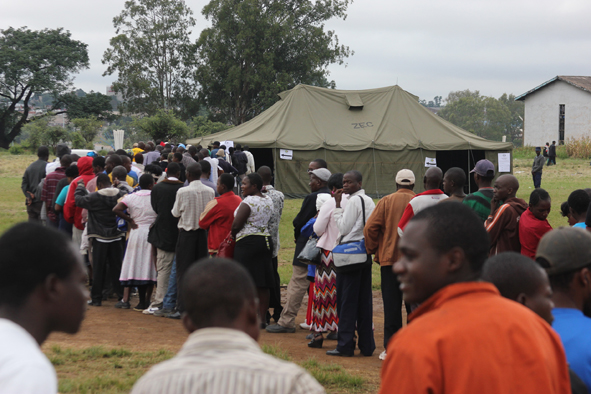
HARARE — Fear of violence and intimidation in the forthcoming elections contradicts political leaders’ rhetorical commitments to peace, raising concerns that Zimbabwe may not be ready to go to the poll, according to the latest report from the International Crisis Group (ICG) released on Monday.
Report by SW Radio Africa
In the report titled Zimbabwe: Election Scenarios, the international think tank said both Zanu PF and the MDC-T are pursuing “winner-take all” strategies, which is likely to mean a hotly contested campaign and possible violence, although expectations are high that a new government will accommodate the losing party in some form of reconfigured power sharing.
The ICG says: “A reasonably free, conclusive vote is still possible, but so too are disputed polls or even a military intervention by security officials supporting, and profiting from, President (Robert)Mugabe’s continued rule.”
According to the Global Political Agreement (GPA), the Periodic Review Mechanism is supposed to produce an annual report on what has been achieved in terms of the GPA. But since the formation of the inclusive government in 2009, only one report has been produced. “This has been the problem of this power-sharing government. There has been no form of internal accountability or even proper monitoring of the process,” the ICG’s Southern Africa project director, Piers Pigou told SW Radio Africa.
The group notes a worrying trend by the international community which appears to emphasise “credible and peaceful”, rather than “free and fair” elections, with no agreement on what constitutes credible.
The political partners in the shaky coalition continue to squabble over the election dates and implementation of reforms. Zanu PF continues to push for a June 29 election date, but the MDC formations say there are several processes that need to take place before any elections can happen, including implementing key reforms.
MDC leader Welshman Ncube said Zanu PF is trying to “confuse and deceive” by repeatedly saying elections will be held at the end of June, even though it is now “technically impossible to have a June election”.
- Chamisa under fire over US$120K donation
- Mavhunga puts DeMbare into Chibuku quarterfinals
- Pension funds bet on Cabora Bassa oilfields
- Councils defy govt fire tender directive
Keep Reading
“If a proclamation was issued tomorrow, elections would be around 5 July. But that proclamation would require the Prime Minister’s consent. We know he won’t. Secondly, calling an election now would involve abandoning the new constitution. If the new constitution is not abandoned then the earliest it can be passed is May 20.
“If passed it will require a mandatory voter registration for 30 days and that will take you to June 22. No election can be called before June 29 without consent of the PM,” explained Ncube.
The MDC leader said based on this scenario the earliest possible date for announcing elections would be July 1 and the minimum period from stating the date to the actual election is 56 days, which would bring the earliest election date to around August 26. The ICG report says deferring the date of elections may be appropriate, to give the authorities time to address their differences, especially on the reforms.
“The country must not rush into elections before addressing these concerns as well as the practical implementation of necessary reforms. Without these, deferring the vote may be appropriate.”
Among the recommendations the group believes that a much clearer commitment by the Southern African Development Community (Sadc), as the guarantors of the GPA, is now needed in Zimbabwe. They call on the regional body to hold a special summit on Zimbabwe that will emphasise compliance with the Sadc, “principles and guidelines governing democratic elections”.
Pigou said Sadc needs to get their “boots on the ground” in terms of long-term observation, and the report suggests the establishment of a Sadc facilitated liaison office in Harare “to monitor and evaluate electoral preparations; define strict benchmarks for compliance by the GPA parties; and establish clear monitoring and observation roles in the election.” This includes supporting the Joint Monitoring and Implementation Committee.







